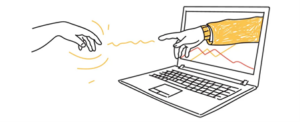Who is a broker and what do they do?
If you’ve decided to trade on the stock market, you have two options. The first is to rely on a portfolio manager. This approach is suitable for those who lack the time or desire to engage in investing on their own. The second option is to do everything yourself: develop an investment strategy and take responsibility for your trades.
However, simply walking into the exchange and trading on your own is not possible. You will need a broker, an intermediary between the investor (you) and the issuer, which refers to the company whose securities you plan to purchase. A broker is a company that holds a license to operate in the stock market and has the authority to execute transactions with securities on behalf of investors.

How do you interact with a broker?
- Enter into a contract with the broker. Familiarize yourself with the terms of the brokerage agreement. Typically, brokers publish a standard contract with their fees on their website. If the pricing and other conditions are acceptable to you, you can either sign the contract at the broker’s office or send notarized documents by mail. Major banks with brokerage licenses often offer the option to conclude the agreement remotely, through their website or mobile application.
- Open an account with the broker and deposit funds into it. Afterward, the broker will be able to purchase securities on your behalf. If you plan to invest in the stock market for more than three years, it is advantageous to open an Individual Investment Account (IIA), which allows you to save on taxes.
- Establish a securities account. The securities you purchase need to be held somewhere. To do this, you need to open a deposit account (securities account) with a depository. The depository may be a separate company that is independent of your broker. However, often brokers have both a brokerage license and a depository license, combining both functions.
- You are now ready to trade on the exchange. You can provide instructions to the broker to buy and sell securities on your behalf. This can be done via phone, online through a specialized trading terminal program, or through the broker’s mobile application.
- The broker executes operations on the stock market based on your instructions. In addition to the funds for purchasing securities, a commission fee is deducted from your brokerage account as payment for the broker’s assistance in executing these transactions.
- With the help of the broker, you can withdraw money from your brokerage account to your bank account. There may be a commission fee for this service as well. The broker will calculate and withhold the tax on your income.
- In addition to the broker’s commission, there may be other expenses associated with each transaction. For example, increased taxes when investing in foreign securities.
- Before accepting an order for a transaction, the broker is obliged to inform you about the costs involved, such as exchange fees and the broker’s own fees.
- The broker should also provide you with information on the current bid and ask prices for the selected financial instruments. Some securities may be illiquid, meaning it may be difficult to find a buyer for them.
- The broker determines how to provide you with information about additional expenses. This can be as simple as a link to a page on their website. Make sure in advance that the information is presented clearly and that you can quickly understand it.
- If the broker fails to disclose all the nuances, resulting in losses for you, you have the right to seek compensation for these losses, including through legal action.
- There are situations where it is crucial to execute transactions very quickly. In such cases, you can choose not to receive notifications about additional expenses so that the broker can immediately carry
When choosing a broker, it is important to consider several key factors. Here are some recommendations:
- License: Make sure the broker is licensed to operate in the financial market. Check if they have a license in the registry of professional participants in the securities market.
- Financial indicators: Examine the list of major brokers. Large trading volumes do not guarantee complete peace of mind, but they indicate that the company has many clients who trust it with significant capital.
- Reputation: Study the broker’s website and read customer reviews online. Pay attention to the company’s history to see if it has been involved in any financial scandals. Search financial news for any relevant information about the potential broker.
- Risks: Before signing a contract with a broker, carefully read the risk disclosure statement. This document provides detailed information about the potential risks associated with trading in the securities market.
- Terms and conditions: Thoroughly review the broker’s service terms. Pay attention to details such as commissions, money transfer timelines, and interest rates if you plan to purchase securities using the broker’s margin. Find out if the broker can use your funds and securities for their own purposes. Inquire about how much the commissions will increase if you restrict the broker from doing so.
When selecting a broker, there are other important factors to consider:
- Software: Find out what is required to trade online. Can you trade through the broker’s website without installing additional software, or do you need to download a specific trading platform? Check the system requirements and verify if the trading terminal can be installed on your computer. If you plan to trade via smartphone or tablet, inquire if the broker offers mobile trading and whether their mobile app is compatible with your devices.
- Voice orders: Some brokers provide the option of placing trades over the phone if you don’t have internet access. Assess whether this feature is necessary for you, keeping in mind that additional fees may apply, and not all brokers offer this service.
- Education: If you plan to trade independently, you’ll need to learn the ropes. Some brokers offer free educational resources such as webinars, instructional videos, and step-by-step guides. Typically, you gain access to these resources upon becoming a client and opening a brokerage account. Explore all the educational opportunities provided by your potential broker, including paid courses, mentoring programs, and financial consultations.
- Demo account: It’s beneficial if the broker’s trading software has a demo mode. By registering on the broker’s website, you can receive download links for the trading program and installation keys. You can then try your hand at investing without opening a real account, using the software in a simulated environment. This allows you to familiarize yourself with stock trading without taking unnecessary risks.
- Commission: All brokers charge commissions for their services. It can be per trade or a monthly subscription fee. Many brokers have a minimum compensation amount per day or. The exchange itself also takes a percentage for executing trades. Clarify whether the exchange fee is included in the broker’s stated commission or if it’s an additional cost.
At the start of your investing journey, when you’re unsure about the volume and frequency of trades, it can be challenging to determine all your needs and find the optimal fee structure. Instead of solely seeking brokers with the lowest commissions, prioritize finding a reliable intermediary. You can always switch brokers if your current one doesn’t meet your expectations.
Remember that a contract with a broker is not a lifelong commitment, and you can change brokers if needed.

If your broker has lost its license, there are steps you can take to protect your assets. Here’s a paraphrased version of the information you provided, using American references:
- Contact your broker: Get in touch with your brokerage firm and inquire about the reasons for the license revocation.
- Protect your funds: Brokers, especially banks, may use your funds for their own purposes. While it may not be inherently dangerous while the broker is financially stable, if the broker goes bankrupt, there is a risk of losing some of your money. It is advisable not to keep large amounts of money in your brokerage account for an extended period. Instead, consider investing in securities or transferring the funds to your bank account. Bank accounts can earn interest and are often insured by the government, providing additional protection.
- Open a segregated account: Another way to safeguard your funds is to open a segrDegated account and include a provision in the agreement that prohibits the broker from using your money. In the event of license revocation, you can swiftly withdraw all your funds from your segregated account. However, keep in mind that the fees for maintaining a segregated account are generally higher than for a regular account, potentially affecting your overall returns.
- Safeguard your securities: Brokers may have permission to use your securities if you grant them that right. This provision is often included in the brokerage service agreement. Even with such an agreement, there is a risk that if the broker borrows your securities and goes bankrupt, they may not be able to return them. Additionally, when companies distribute dividends or coupon payments to shareholders, it is crucial to be the registered holder of the securities at that time. If the securities are with the broker during this period, the dividends or payments may go to the broker instead of you.
- Monitor your accounts: It is important to keep a close eye on your investment accounts. Stay informed about financial news, regularly review statements and reports regarding your brokerage and depository accounts.
It is important to consult with financial professionals or legal experts who can provide guidance tailored to your individual situation and jurisdiction.




